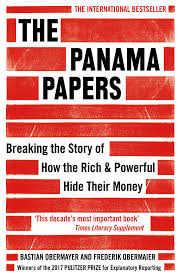What’s it about?
The Panama Papers tells the inside story of the largest data leak in history: 11.5 million files from the Panamanian law firm Mossack Fonseca. Two German journalists, Bastian Obermayer and Frederik Obermaier, received the anonymous tip from a whistleblower known only as “John Doe.” What followed was an unprecedented collaboration between hundreds of reporters worldwide, coordinated by the International Consortium of Investigative Journalists (ICIJ). The leak exposed how the global elite—politicians, celebrities, criminals, and corporations—used offshore tax havens to hide wealth, avoid taxes, and launder money.
How the book is structured
The book reads like a thriller, though everything is real. It alternates between the authors’ personal experiences of handling the leak (encrypted messages, sleepless nights, pressure from governments) and the revelations uncovered: shell companies, hidden assets, and the ways secrecy corrodes trust. It takes readers from Panama to Iceland, Russia, China, Africa, the Middle East, and the United States—showing how corruption is a global system, not an isolated scandal.
Key Revelations
- Heads of state and politicians (e.g., Iceland’s prime minister, allies of Vladimir Putin, relatives of Xi Jinping, members of Middle Eastern royal families) were linked to hidden accounts.
- Global corporations and banks helped clients set up offshore companies to shield money from taxes and scrutiny.
- Drug cartels, arms dealers, and other criminal networks used shell firms to launder money and move it across borders undetected.
- The scale was staggering: over 200,000 shell companies were exposed, revealing a vast shadow economy.
Why it matters
The Panama Papers sparked resignations of politicians, criminal investigations, and new debates about transparency in finance. It revealed how the wealthy live by different rules, eroding public trust in institutions. The book is both a record of journalism’s power and a warning about the fragility of democracy when secrecy dominates economics.
My Take
This book is more than just a catalog of scandals—it is a reminder of why investigative journalism matters. I was struck by the courage of reporters who risked legal and physical danger to bring hidden truths into the light. The Panama Papers made me realize how interconnected our financial systems are, and how inequality is reinforced by invisible structures. It’s a heavy read, but also empowering: proof that transparency is possible when people cooperate across borders.
Memorable Quotes
- “Secrecy is the enemy of democracy.”
- “What the leak revealed was not an anomaly—it was the system.”
- “The world is run by shadows, and only sometimes does the light break through.”
